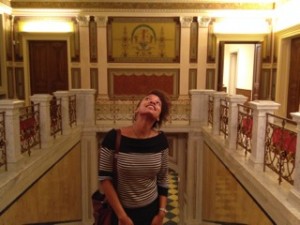During reading week, I had the opportunity to travel to Prague to visit a good friend of mine, and of course, to do research for my Entertainment and Sports law seminar paper.
PIERA SAVAGE <Contributor>

I’d been to Prague a few months before, in late August, when it was still quite warm, and had fallen in love with the charming city. I welcomed the opportunity that reading week provided to return so soon.
One of the great things about Prague is the nightlife, which, after spending long days at different libraries—the National Library had a splendid reading room where I spent a few hours working on my paper—demanded exploration. One such evening at a bar called the Second Floor, I bumped into a lovely woman on the dance floor who I had met on my visit in August. She remembered I was a law student and was excited to invite me to a reception for a law conference that was taking place in a couple of days.
I have to admit I was a little nervous accompanying her to this reception. The conference, the Central and Eastern European Legal Institute’s (CEELI) Central & Eastern European Judicial Exchange Network Roundtable, brought together young judges who were interested in making a difference in their home country’s judicial system. It was focused on how to establish public confidence in the judiciary and how to find effective anti-corruption methods. CEELI, I would later discover by talking with the Executive Director of the institute, Quinn O’Keefe, is a not-for-profit organization whose aim is to foster an international community of reformers who are dedicated to making a difference in law. At the moment, according to their website, the C&EE Network of judges (one of many networks they facilitate) consists of 51 non-high court judges and court administrators from 18 different countries since launching in November 2012. They meet to talk about their personal experiences with corruption and inefficiency, and are advised by legal experts from the Netherlands and the U.S.
The event took place at the Villa Gröbovka, located in a large park of the same name and translates as “vineyard”. As we walked through the park, my friend explained to me that it is the oldest vineyard in Prague, established by Holy Roman Emperor Charles IV. Further research on the CEELI website led to the discovery that the villa was taken over by CEELI for a lease of 50 years, in exchange for restoring the building, which officially re-opened in 2008. The photo above was taken in the entrance stairs and really doesn’t do justice to how beautiful the actual room where the event was held.
The first guest I met, the Honourable Mark Wolf, a Chief Judge of a Federal District Court in Massachusetts, had been invited to the conference as an expert to sit on the panel, and to give encouragement to the young judges who were bold enough to try to change their judicial systems from the inside out. I should mention that Chief Judge Wolf has been recognized as being the one who got to the bottom of the James “Whitey” Bulger case with a 661 page opinion, and he was recently featured in a New York Times article, ”The Judge who Cracked the Bulger Case”. He was a warm, friendly man who worked the room and though I was merely a second-year law student, went out of his way to introduce me to various guests.
There was one young man from Slovakia, Vladimir, who Chief Judge Wolf was particularly proud of, and introduced to nearly every guest who arrived. He was a very tall man who wore horn-rimmed glasses; bearded, he said, because he was in a transition period trying to decide whether he should get into teaching or head down the path towards becoming a judge. He told us his father and grandfather had been lawyers and it was never a question of whether or not he would get into law. Upon meeting Chief Judge Wolf, who spoke at his university a few years before, he had been inspired to consider a role in the judiciary and to take on a greater role in improving the system in Slovakia.
Much of the conversation with him was very serious, however, despite the fact that his English was almost perfect, he often said “true dat” when agreeing to something, which made me smile on the inside because it was said with such sincerity. In any case, it seemed that a combination of meeting so many young judges (the youngest I met was a Romanian woman with a blonde bob who was 32 years old) and the effusive praise by Chief Judge Wolf who introduced him as “a very special man” had convinced him that he did, in fact, want to become a judge. I imagined the next morning Vladimir would be shaving his beard.
A few other guests were a political officer who worked at the US Embassy in Bratislava, who was next going to move to Yemen; a Czech writer who published a political magazine, Tablet; and the founder of Radio Free, a station launched at the start of the Cold War that delivered uncensored news to people behind the Iron Curtain.
I felt almost as if it was fate that I had bumped into my friend. Just that week I had been questioning—as many law students do—everything. Should I really get into entertainment law? Will I be happy in that field long term? Maybe yes, and maybe no, I still am not sure. But what I walked away with was the importance of a mentor to a mentee in shaping a career; the importance of passion in a career—it really shines through—and of course, the importance of taking any opportunity to network, especially when the chance arises in a setting as lovely as in a villa in Prague.
